#aymee garcia
Text
Video Review: Les Misérables, 3rd National Tour, 2000, Act II (long)
Here’s the second half of my review of this complete Les Mis performance, which I wrote some time ago but I'm sharing again in honor of Barricade Day.
Main Cast
Jean Valjean: Ivan Rutherford
Javert: Stephen Bishop
Fantine: Joan Almedilla
Thénardier: J.P. Dougherty
Mme. Thénardier: Aymee Garcia
Marius: Tim Howar
Enjolras: Kevin Earley
Éponine: Sutton Foster
Cosette: Regan Thiel
Grantaire/Bamatabois: Trent Blanton
Young Cosette: Stephanie Mieko Cohen
Gavroche: Christopher Carlson
“Upon These Stones,” “On My Own,” “The Barricade,” “Javert at the Barricade,” “Little People”
Sometimes the smallest details can change our impressions of a character. For example, Sutton’s Éponine purposefully gets Marius’s attention by touching his back as she walks past him. Éponines who do this create a different sense of their desires and motives than Éponines who don’t. There’s also a big difference between Éponines who sing “Little you know! Little you care!” alone after Marius leaves and those who, like Sutton here, sing it as an outburst directly to Marius’s face, angrily snatching the letter from his hand. Every Éponine I ever saw in both the 3rd National Tour and the 2006 Broadway revival did the latter. Personally, I think it’s a bit petulant compared to singing the line alone. But if we assume she’s come to the barricade hoping Marius will finally love her for joining the battle – which her purposefully letting him know she’s there might imply – and yet he still doesn’t get it, I suppose an outburst to his face is understandable.
I like that neither Tim’s Marius nor Ivan’s Valjean are too harsh with Éponine. Tim strikes a good balance between stern and caring, while Ivan is nicely gentle instead of automatically treating her like a spy for Javert. His letter-reading is good too, though I wish the camera showed his face instead of focusing on Éponine as she eavesdrops.
I’ve written about Sutton’s “On My Own” before, but I’ll restate my feelings here. I honestly don’t think anyone has ever sung the song more beautifully; her voice is like flame and crystal combined in sound form. And her journey from happy dreams to raw anger and despair is vivid and deeply felt without a trace of sentimentality. I can’t fault it, even though I personally don’t care much for angry renditions of this song.
The barricade boys’ pledge to hold the barricade and defiance of the officer’s warning are gripping as they should be, especially the magnificent high A sung by Ben Davis’s Feuilly on “We’ll be there!” It’s no wonder that he went on to sing operatic roles as well as musical theatre.
Christopher’s Gavroche comes into his own in “Little People.” His Act I might have been slightly bland, but here I can fully believe in his spunk and cheek.
Kevin’s commanding presence as Enjolras and the rich-voiced stolidness of Stephen’s Javert are still outstanding.
The tone of the “Little People” scene definitely changes when the now usually-cut lines before and after “Shoot me now or shoot me later…” are included. Instead of just a few boys clamoring ineffectually in the background to shoot Javert, the barricade erupts into chaos after Javert is outed as a spy, with Courfeyrac, Feuilly and others forming an impromptu firing squad to shoot him in blatant defiance of Enjolras’s orders, and with Enjolras and Combeferre’s cooler heads just barely prevailing in the end. I still wonder why the scene was written this way, when it has no basis in the novel. I can only assume the musical’s authors thought it would be more moving to see the barricade boys come close to falling into bloodlust and anarchy under the stress of adversity, only to ultimately choose idealism, courage and unity, than if they were always disciplined and unified. Maybe on the stage, this is true.
At any rate, I like the detail of Gavroche grabbing a gun to join the impromptu firing squad and a woman trying to wrest the gun from him. It’s a welcome, subtle touch of comic relief and fully in character for the boy.
“A Little Fall of Rain,” Night of Anguish,” “First Attack, “Drink With Me”
Kudos to Sutton for remembering to act wounded even before she collapses, climbing very slowly down the barricade, having to stop and rest midway down, and then clutching Marius for support. Not all other Éponines do that. During the song she never cries out or writhes in pain, but I think it works. The motionless tension of her body makes me assume that her Éponine is hiding her pain from Marius, which fits with the lyrics, and of course lets us focus on the moment’s tender emotions. In the last verse, I like the way she gently fades away, loosening her grip on Marius’s arm and lying completely still except to move her lips as she sings, but then, at the very end, finding the strength to pull herself up and kiss him. It evokes the way Hugo’s Éponine lies so motionless that Marius thinks she’s already dead, only to open her eyes and utter her love confession.
Tim’s concern and tenderness compliment Sutton’s performance perfectly, and though his grief is quiet and understated, it’s still poignant.
The moment when Enjolras comforts Marius is understated yet touching too. Kevin’s Enjolras is clearly pained by Éponine’s death but seems at a loss for what to say or do for Marius. In the end, a silent shared arm-clasp is all that’s needed.
When Valjean arrives, the Amis take a fairly calm, wary yet respectful approach to interrogating him, lowering their guns as soon as they realize he’s not a real National Guardsman. I’m tempted to like this better than versions like the 2012 movie where they’re aggressive and almost ready to shoot him on sight, although the latter is valid too.
During the battle, I see another detail I remember reading about in reviews. When Kevin’s Enjolras kneels down to assist the student who’s been wounded by the sniper, only to be narrowly missed by another bullet from said sniper, he falls backward and sits paralyzed in shock, looking like “a frightened little blond boy” (as I remember one fan writing) until Valjean helps him up. I know that some fans can be touchy about Enjolras showing any weakness, but I personally don’t mind this detail. It’s only a brief moment, and like the above-mentioned moment with Marius, it’s a humanizing image that makes Enjolras believable not only as a staunch leader, but as a young man facing the threat of death for the first time. (Yes, I know Hugo’s Enjolras also fought in 1830, but the musical never mentions this.)
Besides, I love the way Grantaire snaps out of his motionless stupor to reach out to Enjolras when that brush with death occurs.
Stephen and Ivan are both excellent in the releasing scene. Stephen moves believably from rage and disgust at having Valjean as his executioner, to confusion when he’s freed, to smug disdain when he thinks he’s figured out Valjean’s motive, to a slow, speechless, dumbfounded exit, while by contrast Ivan’s Valjean remains staunchly calm, not losing his temper at Javert’s insults, but firmly committed to doing the right thing.
Moving on to “Drink With Me,” Trent’s Grantaire puts an interesting spin on his solo by addressing specific lines to specific individuals, to whom (if we know the Ami’s individual personalities in the novel) each line has the most meaning. “Can it be you fear to die?” he directs to Joly, the hypochondriac. “Will the world remember you when you fall?” is aimed at Feuilly, the orphan who has no family to remember him. And of course “Will your death be one more lie?” he addresses to Enjolras.
Then we have a beautiful Enjolras/Grantaire reconciliation, which unfortunately the cameraperson only shows us in part. Enjolras first stares at Grantaire, then angrily grabs his shoulder, with poor Grantaire shielding his face as if he expects to be hit. But then they gaze at each other, for a long time, and then finally, warmly clasp hands. It’s too bad that the cameraperson chooses to pan around the stage during their long shared gaze instead of showing us their expressions leading up to the hand-clasp. But I suppose the E/R relationship wasn’t quite at the fandom’s forefront in 2000 the way it is now (it was already a popular ship, if I remember correctly from my middle and high school days, but slightly less so than Éponine/Marius or Enjolras/female OCs).
Tim’s soft, sad delivery of Marius’s verse at the end is very touching and I like the consoling pat on the knee Trent’s Grantaire gives him before walking away
The ensemble work is excellent, as always.
“Bring Him Home,” “Dawn of Anguish,” “Second Attack (Death of Gavroche),” “The Final Battle,” “Dog Eats Dog”
Ivan’s “Bring Him Home” is beautiful.
I hope that someday, somehow I see a production of Les Mis that includes the “Drink With Me” reprise. It add so much more emotional weight than there is when the women simply hurry off and the battle commences. By the way, here’s a question for people who were fans before the cuts were made. Did the “Drink With Me” reprise always end with Enjolras and Marius clasping arms at the top of the barricade? Was this a universal part of Nunn and Caird’s staging? It’s a beautiful reinforcement of Enjolras and Marius’s friendship and Marius’s now-unwavering loyalty to his friends, but still, if I were to direct a new production, I’d be tempted to have Grantaire share that moment with Enjolras instead. I think it might be a better moment for their reconciliation than “Drink With Me.”
Christopher’s Gavroche is still less vivid than others I’ve seen, and the moment of his death looks slightly unconvincing (he breaks the fall with his hands a bit too obviously), but he still gives a solid performance overall.
To the very end, Kevin’s Enjolras is fully believable as the staunch, dignified, heroic leader, yet still a human being. His slow descent from the barricade after Gavroche’s death – the only movement onstage while everyone else is frozen in shock and grief – and seeming obliviousness to the offstage officer’s voice as he stands and ponders what’s happened and what’s to come is both poignant and true to the spirit of Hugo’s Enjolras. We can sense his pain, yet he faces it with stoic dignity and undying courage. His “Let others rise…” is powerful, even though he neither shouts nor goes for the high note on “…is free!”
And then there’s the heartbreaking moment after Marius falls, when Enjolras hurries to him, throws poor Grantaire aside, and tries vainly and irrationally to revive his seemingly dead friend before rushing off to his own death. Some might argue that this is out of character for Hugo’s Enjolras, and it’s definitely not realistic for the middle of a battle when, as Hugo repeatedly writes, you can’t stop for anything. But it’s moving, although I would have liked a more meaningful last interaction with Grantaire than just a quick glance.
The fall of the barricade and the tableau of Enjolras’s body on the barricade are epic and heartbreaking, as always. No other staging can surpass the original.
J.P.’s Thénardier definitely feels more alive in his sinister scenes than in the comedy scenes. I’m not quite sure why I always remembered him as being mainly a comic Thénardier. It was probably his looks, I’m sorry to say – it was too easy to mentally pigeonhole him as “the funny fat guy.” At any rate, his “Dog Eats Dog” is deliciously dark and mocking.
“The Sewers,” “Javert’s Suicide,” “Turning,” “Empty Chairs at Empty Tables,” “Every Day”
I remember one thing J.P.’s Thénardier used to do that annoyed fans back in the day was to silently break the fourth wall by visibly waiting for the audience to applaud after “Dog Eats Dog,” then shrug his shoulders when they didn’t. He did this the first time I saw the show. But thankfully he doesn’t do it here.
Kudos to Ivan for actually carrying Marius throughout the sewer sequence. We get none of the standard “Marius tries his best to look unconscious and disguise the fact that he’s actually walking while Valjean supports him” business seen in so many other performances.
Stephen gives a powerful rendition of “Javert’s Suicide,” both in his sumptuous voice and in his vivid rage and torment.
“Turning” is poignant, as it should be. The fact that the pregnant woman is played by a black actress instantly makes me think of the fandom’s widely-accepted headcanon of Musichetta as a woman of color – as far a my imagination is concerned, it’s her, and the unborn baby’s father was either Joly or Bossuet. I��ll also imagine that she’ll eventually meet Marius and Cosette and they’ll help to support her and provide for the baby.
Tim’s “Empty Chairs at Empty Tables” is beautiful and moving. His warm, darkly-shaded voice is wonderfully suited to the music, and while his grief is subtly conveyed, it can still be deeply felt. This is a trend throughout this particular performance, I think: the story is told with as little sentimentality as the material allows, and the male characters in particular are all played with a stoicism not seen in other portrayals, but their emotions can still be felt no matter how quiet they are.
The uncut “Every Day” is gently and sweetly performed by Regan, Tim, and Ivan when he joins them. The ending is adorable, with Marius and Cosette holding hands and almost face-to-face when they notice Valjean watching them, and being the modest 19th century pair they are, quickly draw apart and try to look “seemly,” only for Valjean to lovingly rejoin their hands. Unfortunately, Regan goes a bit off-pitch on her final note, but that note tends to be a hit-or-miss one for most Cosettes.
“Valjean’s Confession,” “Wedding Chorale/Beggars at the Feast”
Ivan and Tim are both spot-on in “Valjean’s Confession.” Ivan is more stoic than Hugo’s Valjean is in this scene, but this is true of his Valjean throughout, and as always, in his subtle way he still conveys his struggle and pain. I’ve heard other Valjeans be more forceful and demanding on “Promise me, M’sieur, Cosette will never know!” but the way Ivan’s voice becomes so soft and pleading instead is probably even more disarming to Marius.
Moving on to the wedding, it’s so nice to hear Marius’s exchange with the Thénardiers uncut. Éponine is remembered, her parents earn more hate with their cold, selfish response, and they build up their revelation about Valjean with just the right preamble to entice Marius – even if they do have to chase him around the ballroom to do it. I notice that Tim’s Marius tries to walk away before Thénardier brings up the “murder” (presumably he thinks they’re just going to reveal that Valjean is a convict, which he already knows), but a soon as Thénardier makes the murder claim, he becomes concerned and listens. This is different from Niklas Andersson’s London Marius in the same year (so far the only other video I’ve watched of the uncut scene), who stalked away in disgust after Thénardier made the murder claim, refusing to believe that Valjean could be a killer as well as a thief.
Regan’s Cosette looks appropriately startled and confused after Thénardier drags her into a wild spinning dance and then Marius punches him. I wonder if she recognized him in that moment?
J.P. and Aymee do a fine job with the Thénardiers’ final flourish. Just enough slapstick to get laughs (e.g. Aymee’s pantalette-flashing fall when she tries to curtsy, the business with the dropped silver later), but not enough to turn them into caricatures. “Beggars at the Feast” is just the right exuberant uplift (however cynical the lyrics) that we need before the finale.
Epilogue
As is characteristic of this cast, Valjean’s death and heavenward ascent are depicted calmly and gently, with tears and sentimentality kept to a minimum, but with genuine love and warmth in abundance. Ivan’s Valjean infuses his last moments with quiet dignity and tenderness, as well as beautiful soft singing, while Joan’s Fantine is appropriately angelic, and Regan’s Cosette, Tim’s Marius and Sutton’s Éponine beautifully round out the scene. The moment when Fantine kneels before Valjean and he reaches out to take her hand, only for Cosette to take her mother’s place for their last reunion, is very touching. So is the way Regan’s Cosette lingers over her father’s lifeless body, staring into his face in utter disbelief until finally Marius gently draws her away. The little hug she gives Marius near the end of the final chorus is also as sweet as can be (as I’ve mentioned before, they were a couple in real life at the time).
The final chorus is magnificent, as it always should be. An excellent end to an excellent performance.
#les mis#les miserables#performance review#bootleg#video#3rd national tour#us tour#act ii#los angeles#2000#ivan rutherford#stephen bishop#sutton foster#tim howar#kevin earley#regan thiel#j.p. dougherty#aymee garcia#trent blanton#complete performance
7 notes
·
View notes
Text
Into The Woods at the St. James Theatre Review: Believe the hype
Today marks two weeks since I saw @ITWBroadway, and I have not stopped thinking of it since. I have seen a great deal of theatre, but this was simply breathtaking. An absolutely gorgeous show, and this is a simply magical production of it.
With a cast as glittering as Cinderella’s slippers, Encores! production of Into the Woods is phenomenal
(more…)
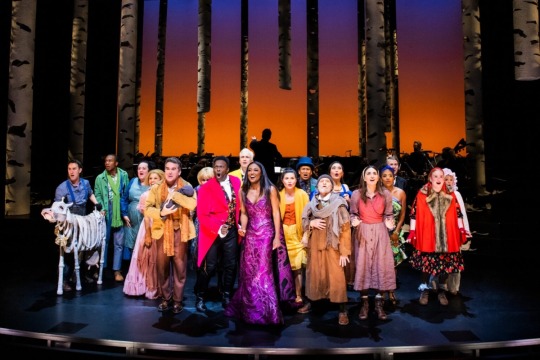
View On WordPress
#Albert Guerzon#Annie Golden#Aymee Garcia#Broadway#Cole Thompson#David Patrick Kelly#Felicia Curry#Gavin Creel#James Lapine#Joshua Henry#Julia Lester#Kennedy Kanagawa#Musical Theatre#Musical Theatre review#Nancy Opel#Sara Bareilles#Stephen Sondheim
0 notes
Text
Every time I see some idiot proclaim "Jim Henson wouldn't have wanted this" under queer-positive, anti-racist or otherwise anti-bigotry posts by Sesame Street, Muppets or related fan accounts, I gotta laugh.
Like, do y'all know who Jim Henson even WAS?! He was, by the gods, no perfect person, but do y'all honestly think he'd be on your side as you spew hatred against minorities? The man that had a TV series created with the literal goal to teach equality and social systems and that'd help stop wars?!
Actually, let me bring up other Muppeteers while I am at it, who'd likewise not support y'alls crap: Dave Goelz, famously basing his characters on himself at least in part, playing the very gender-expression-flexible Gonzo and supporting the queercoding of Boober in "The Glow". Bill Baretta, performing Pepe the King Prawn who canonically has described sexuality as fluid. Richard Hunt, who performed Scooter, Mudwell the Mudbunny and many more, a gay puppeteer. Frank Oz, performer of Fozzy Bear, Animal, Bert, Miss Piggy and more, 1st Gen. Immigrant from a Jewish-Catholic mixed family. Kevin Clash, a Black man who made his own career as a puppeteer since he was a teenager. I could go on and on. Aymee Garcia. Peter Linz. Frank Meschkuleit. John Tartaglia.
Your bigotry has no place on Sesame Street, nor with any Muppet media. It never has. From the start, Jim Henson, his fellow creatives, and the people who carry on his work have promoted kindness, education, creativity and equality.
If you think any of them would agree with your bigotry, you have not been paying attention.
#special interest#autism#jim henson#muppets#the muppets#puppetry#personal rant#rant#fraggle rock#sesame street
307 notes
·
View notes
Text
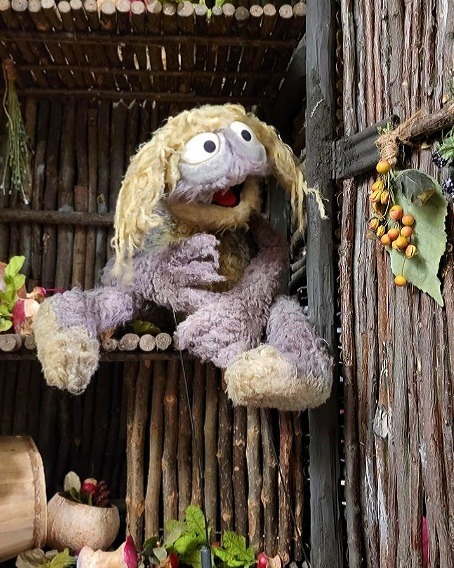
Begoony
PERFORMER John Pattison
DEBUT 1985
DESIGNMichael K. Frith designer[1]
Begoony is a magical rabbit-like creature who Mokey befriended in the Fraggle Rock episode "The Incredible Shrinking Mokey." He had been abandoned by many before, and didn't want Mokey to abandon him, so he tried to shrink her and lock her in his house. This only made Mokey (sort of) abandon him, but after he makes a beanstalk for a puppet show, he is allowed to live amongst the Fraggles.
The puppet was later reused in The Muppet Christmas Carol (as the child of Mudwell the Mudbunny and Murray the Minstrel) and in Muppet Treasure Island (as a pirate). On Mopatop's Shop the puppet would be used in various roles like the moon creature Clicksnizz, Pippa Pepper, and Granny Rose. In Muppets Tonight, Begoony made an appearance as an audience member.
In 2022, the puppet would return back to its original roots in Fraggle Rock: Back to the Rock. Here, the puppet is used for a different character named "Bongo," performed by Aymee Garcia, who recurs as a pest in Boober's pantry in episodes 112 and 204
66 notes
·
View notes
Photo

Source: the Bay Area Reporter, 20 July 2000
There was a time when the future of the musical theater looked like Les Miserables. Now it‘s starting to look like nostalgia.
This standard bearer for the humorless quasi-operatic epic is back in San Francisco after a seven-year hiatus, like a visit from an old friend who isn’t quite as fascinating as you once thought. The touring production at the Curran Theatre is a perfectly respectable affair, but emotional connections have given way to cordial appreciations.
Victor Hugo’s sprawling novel is recounted in the broadest of strokes, like a phonebook sized issue of the old Classics Illustrated Comics. But watching how the musical manages to coherently communicate such an expanse of storytelling becomes part of the entertainment.
Originally created as an outdoor spectacle for a Paris sports arena, Claude-Michel Schonberg and Alain Boublil’s sung-through adaptation of Hugo was massaged into a more traditional theatrical format by directors John Caird and Trevor Nunn. Even if the ubiquitous turntable and the other devices they employed are beginning to seem a little yellowed at the edges, the economy and grace with which the story is told remains an impressive sight.
The backbone of the show is Schonberg’s music that manages to lace battle hymns, lullabies, and personal anthems with a contemporary edge that doesn’t sound anachronistic. The music sounds important, but possesses a repetitive simplicity that makes it accessible in the moment and less interesting in the long run. The English lyrics that Herbert Kretzmer based on Boublil’s French originals can fall into simplistic rhymes and unexpected phrases like “What’s up?” but they fill the large emotional outlines set by the music.
This is not a stripped-down production at the Curran, but a faithful replica of what’s been playing on Broadway for 14 years. The cast is a spirited, talented group that shows few signs of road fatigue. The sound, though, was often out of balance at a performance well into the Curran run.
Ivan Rutherford as the noble Jean Valjean, Graham Rowat (subbing for Stephen Bishop) as the obsessed Inspector Javert, Joan Almedilla as the godforsaken Fantine, Aymee Garcia and JP. Dougherty as the comically sinister Thernadiers, and Diana Kaarina as their pitiful daughter Eponine all impressively inhabit their characters. But as the young hero Marius, Tim Howar can get lost in the crowd, and as his beloved Cosette, Regan Thiel comes up short with a lightweight voice and personality.
Like all successes, Les Miserables was in sync with its times. But classics are in sync with all times. Victor Hugo’s novel is a classic. Its musical counterpart seems increasingly unlikely to become one as well.
Les Miserables will run at the Curran Theatre through Sept. 16.
Tickets are $17-$77. Call 512-7770.
15 notes
·
View notes
Note
Character ask: Cinderella's Stepsisters (Cinderella Broadway)
Favorite thing about them: They're both likable in very different ways. I like Charlotte for being a classic "ugly stepsister" – a comically brash, arrogant, silly brat. And I like Gabrielle for being secretly a nice, friendly person, for finding romance with the revolutionary Jean-Michel and a social conscience along with it, and for eventually breaking free from her mother's demands and fully embracing Cinderella as her sister, all while still being dorky in a cute way. Even though her portrayal is slightly derivative from Ever After's Jacqueline and from the redeemed Anastasia in the Disney versions' sequels, I don't mind.
Least favorite thing about them: While I like Gabrielle as a character in and of herself, making her sympathetic means we lose the fun of the stepsisters as a comic duo. That's a big change from all the earlier versions of the Rodgers and Hammerstein musical! I also prefer the original duet version of "Stepsisters' Lament" to the retooled "Stepsister's Lament" – when the two stepsisters sing the song, it's just about them, but when it's sung by a whole chorus of jealous girls led by Charlotte, it pits all the other girls at the ball too much against Cinderella.
Three things I have in common with them:
*I like pink and magenta.
*Like Gabrielle, I enjoy feeding the homeless.
*Like Charlotte in most productions, I'm heavyset.
Three things I don't have in common with them:
*I don't have a sister or a stepsister.
*My father is still alive.
*I don't wear my hair in gaudy pretzel braids or twin buns.
Favorite line: Gabrielle's first aside to Cinderella that reveals that she isn't like her mother or sister:
"Madame isn't always terrible. Sometimes she sleeps."
brOTP: For Gabrielle, Cinderella, once she gains the courage to help her and call herself her sister. For Charlotte, possibly Gabrielle and maybe even Cinderella in the future, if the hug she and her mother share with Gabrielle in the final wedding scene implies redemption.
OTP: For Gabrielle, Jean-Michel. For Charlotte, some man she hasn't met yet.
nOTP: Prince Topher.
Random headcanon: After being forgiven by Cinderella and reconciling with Gabrielle, Charlotte just might become a better person. At any rate, her future will probably be happy, because the fact that she's both the stepsister of the princess and the sister of the Prime Minister's wife will raise her into high society, and she'll likely find a decent husband before too long.
Unpopular opinion: I like them, but I almost wish they were in a different, original adaptation of Cinderella, not a retool of the Rodgers and Hammerstein musical.
Song I associate with them:
"Stepsister's Lament"
youtube
"A Lovely Night"
youtube
Favorite picture of them:
Stephanie Gibson and Ann Harada, with Fran Drescher:
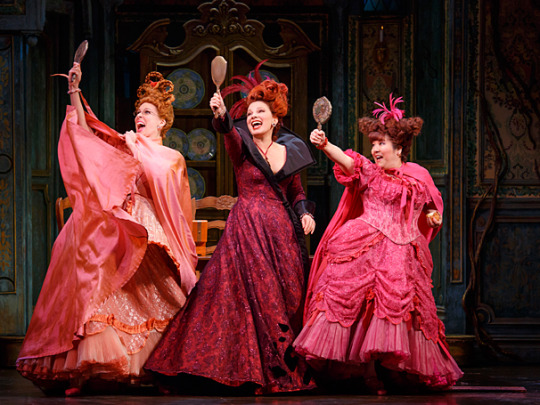
The same two actresses with NeNe Leakes and Keke Palmer:
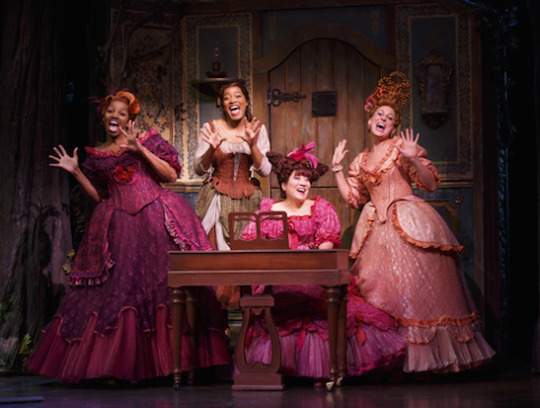
Kimberly Faiure and Aymee Garcia, with Kaitlyn Davidson and Blair Ross:
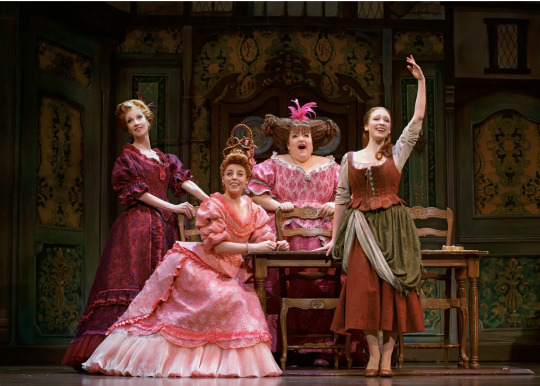
#character ask#cinderella's stepsisters#gabrielle and charlotte#cinderella#rodgers and hammerstein#2013#broadway#musical#ask game#fictional characters
7 notes
·
View notes
Text
Muppet Song of the Day: "One Heart"
Written by Harvey Mason Jr.
Requested by @Champ2stay on Twitter
#muppet song of the day#fraggle rock#fraggle rock: back to the rock#gobo fraggle#john tartaglia#junior gorg#dan garza#marjory the trash heap#aymee garcia#dave goelz#karen prell#donna kimball#jordan lockhart#harvey mason jr.
61 notes
·
View notes
Photo

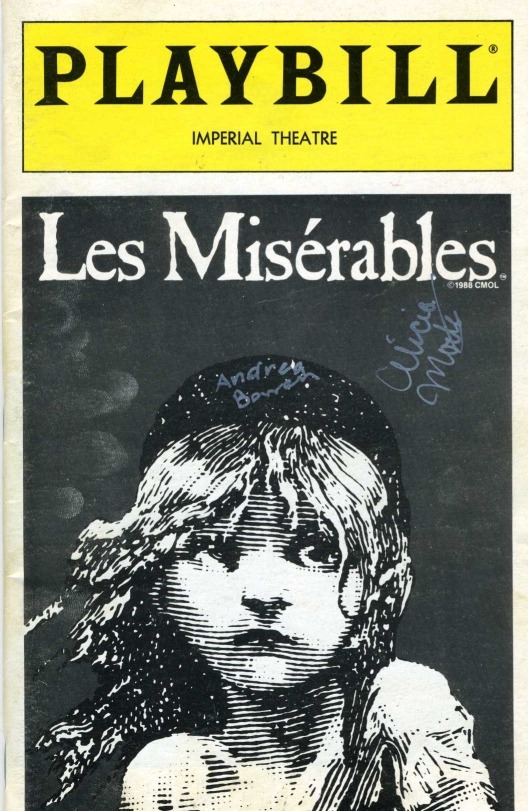
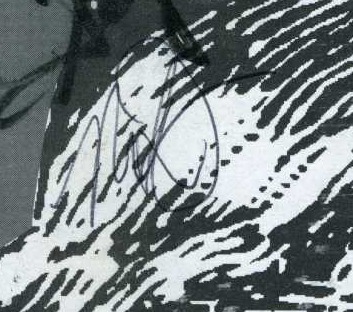
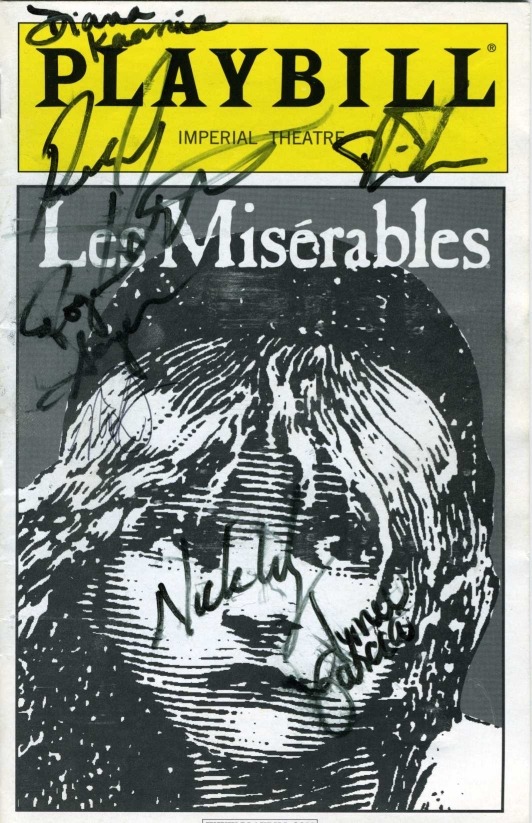

A few Les Miz over the years. Including Nick Jonas in his Gavroche days!
#Broadway#playbill#Nick Jonas#Andrea Bowen#Alicia Morton#Les Miserables#Robert Marien#Nick Wyman#Aymee Garcia#Diana Kaarina#Christiana Anbri#Andrew Hoeft#Alexandra Rose Sullivan#in person autograph#autograph#jean valjean#young cosette#gavroche#thenardier#mme thenardier#eponine
1 note
·
View note
Text
PBS Kids News (12/7/17)
1. Odd Squad
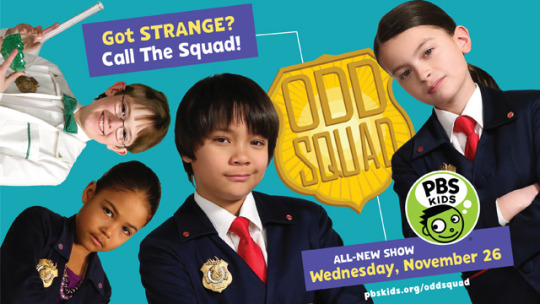
On Monday, January 15, PBS KIDS will premiere a brand new one-hour movie from the multiple Emmy Award-winning series, ODD SQUAD. In ODD SQUAD: WORLD TURNED ODD, agents Oona, Olympia, and Otis accidentally change the past and undo every odd case Odd Squad ever solved. The agents embark on a mission across time to set things right, using a variety of math skills and teamwork. Following the “odd” movie premiere, fans can stick around for a special sneak peek of PBS KIDS’ newest upcoming series, PINKALICIOUS & PETERRIFIC, which premieres February 19.
(I’m really excited for the special, and the sneak peek!)
2. Splash and Bubbles
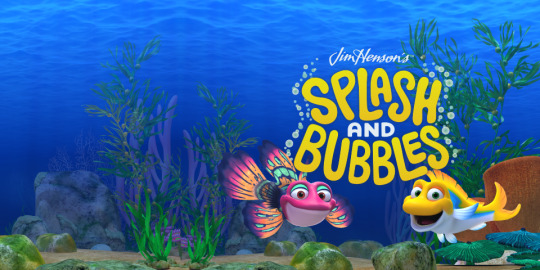
The Jim Henson Company, Herschend Studios, Varèse Sarabande Records, and The Cutting Edge Group announce the inaugural release of music from the hit PBS Kids preschool series, Splash and Bubbles. The single, "And So We Celebrate (Coral Day)" will be available on all major digital retailers on December 1, 2017, in celebration of the holiday season and the all-new episode "Coral Day" premiering on December 11, 2017 (check local listings).
In "Coral Day," it's the holiday season in Reeftown and everyone is getting ready for Coral Day, a celebration of the wonderful coral that makes up their home. Splash, new to Reeftown and its traditions, wonders what he can contribute to the festival.
With themes of unity, family, friendship, and gratitude, the single written by award-winning songwriter Mike Himelstein and his long-time Henson collaborator Dena Diamond, features vocals from cast members including the show's creator John Tartaglia as Splash, Leslie Carrara-Rudolph as Bubbles, Raymond Carr as Dunk, and Aymee Garcia as Ripple. "And So We Celebrate (Coral Day)" is a true holiday classic in the making.
(But why didn’t they release the single under PBS Kids Tunes? All the other music for other shows gets released under that label)
ALSO: Herschend Enterprises and Sally Corporation have announced an agreement to develop a new family dark ride based on the hit animated show Splash and Bubbles. The series, co-produced by The Jim Henson Company and Herschend Studios, Herschend Enterprises’ media arm, encourages children to explore ocean science and marine biology through character driven comedy. Airing daily on PBS stations nationwide and for free on PBS KIDS Video app, Splash and Bubbles consistently ranks among the top five PBS KIDS series for children ages 2-8 each month and is available worldwide on Netflix and via broadcast in international territories including Canada, Europe, Latin America and the Middle East.This new alliance between Herschend Enterprises and Sally Corporation marks the first time the two entertainment companies are collaborating on a ride of this type. Sally Corporation debuted the new attraction concept at the IAAPA Attractions Expo (International Association of Amusement Parks and Attractions), the largest convention in the theme park industry, which hosted more than 37,000 attendees in Orlando. In addition to providing Sally Corporation development rights, Herschend has developed a line of custom merchandise, including plush and apparel, based on the series.
(So apparently the show is so popular its getting a ride. I think it would be cool if RJG got its own ride that takes you through the solar system)
3. Ready Jet Go!

https://www.commonsensemedia.org/tv-reviews/ready-jet-go-holidays-in-boxwood-terrace
So apparently, Common Sense Media reviewed Holidays in Boxwood Terrace. What? The episode isn’t supposed to air until next Monday as of this writing! I read the review and it is filled to the top with spoilers. DO NOT READ THE REVIEW. I’m still excited for the ep, but I need to figure out how to forget all the spoilers. 4 more days guys. Hang in there.
4. Thomas and Friends

https://www.facebook.com/unctv/videos/10159512830105164/
I’m exactly a month late, but whatever. Anyways, it’s official. Thomas and Friends, a long-running staple of PBS (its been on PBS since 1989, if you count Shining Time Station’s run on the channel), is leaving PBS Kids for good in 2018.
You read that right. Even though Thomas and Friends was never my favorite on PBS Kids, but it was still a good show. It did go downhill when Sharon Miller became the head writer, but it got better when Andrew Brenner or whatever his name is took over.
I wonder why its being removed? Low ratings? Not enough funding? Who knows? PBS didn’t exactly treat it the best either. I almost never see it on WTVI PBS Charlotte, except maybe on weekends. Whatever the case may be, I’ll miss this show.
0 notes
Text
Video Revew: Les Misérables, 3rd National Tour, 2000, Act I (long)
In honor of Barricade Day, I’ve decided to re-share the review I wrote some time ago of an outstanding complete Les Mis performance from yesteryear. The multi-part upload I originally reviewed has been taken down, but the whole performance can still be seen on YouTube in a single video here.
This performance by the US 3rd National Tour (a.k.a. the Marius Company) was filmed at the Ahmanson Theatre in Los Angeles, February 7, 2000.
Main Cast
Jean Valjean: Ivan Rutherford
Javert: Stephen Bishop
Fantine: Joan Almedilla
Thénardier: J.P. Dougherty
Mme. Thénardier: Aymee Garcia
Marius: Tim Howar
Enjolras: Kevin Earley
Éponine: Sutton Foster
Cosette: Regan Thiel
Grantaire/Bamatabois: Trent Blanton
Young Cosette: Stephanie Mieko Cohen
Gavroche: Christopher Carlson
“Work Song,” “On Parole,” “Valjean Arrested, Valjean Forgiven,” “Valjean’s Soliloquy”
Ivan Rutherford’s Valjean lives up to all my positive memories of the three times I saw him onstage. His voice is excellent for the role: bright, rich and mellow, yet with a hint of grit that suits the convict, and effortlessly capable of both sweetness and power. Acting-wise, he’s subtler than some other convict-Valjeans, but still portrays a fully realized, nuanced and engaging character. Other actors are more aggressive to Javert and more visibly ecstatic on “Freedom is mine…” but Ivan’s portrayal seems a bit truer to Hugo’s Valjean, who was always a quiet, self-contained man and whose hardening from his years in prison makes him even less inclined to show emotion. Yet his anger becomes clear with his increasingly fearsome responses when others reject him. The growing darkness in him is evident when he shouts at the innkeeper’s wife, especially with how delicate, polite and frightened she’s portrayed as being. Then at the Bishop’s house we see him disturbingly become “a thief in the night,” as he plots the theft of the silver in a sneering, calculating tone, and then bows his head before the Bishop in feigned abject gratitude, only to steal the silver with a sneaky, quietly growled “…flight!” rather than a wild shout. The theft definitely feels like a premeditated, malevolent act rather than an impulsive, desperate one. Yet he still conveys sympathy-earning vulnerability too, with the abject, beaten dog-like fear he shows when the Bishop first approaches him and when he thinks he’s about to be sent back to the galleys. And at the end, he gives us a truly impassioned Soliloquy, full of rage, anguish, confusion, and ultimate determination to change.
Stephen Bishop was my first Javert and his performance here is exactly the way I remember him. Tall and imposing, with a rich, robust baritone voice, and just the right attitude of dignified condescension. Well I remember his snide, disdainful “No” in response to Valjean’s ‘Yes, it means I’m free!” I remember that Arlene C. Harris, the author of the Les Misérables sequel series Pont-au-Change, wrote in her review of this cast that his Javert was too smug, too much like ‘Gaston (from Beauty and the Beast) in a police uniform,” and I’ll admit I can see a little of that here. But at the same time, he’s very professional and avoids needless aggression. He’s the only Javert I’ve seen so far who doesn’t intimidate Valjean with his nightstick on “Do not forget me, 20601!” and despite his disdain, he hands Valjean his yellow passport in a civil way, not playing the games with it (e.g. smacking it against his chest, pulling it out of his reach at first, or dropping it for him to pick up) that other actors do.
The Bishop has a very nice voice and gentle, serene bearing, though he doesn’t make as strong an impression as some others.
The 3rd National Tour was always known for its outstanding ensemble and they do indeed seem excellent so far. One thing that stands out for me, though, is their subtlety. They don’t do too much shouting when Valjean turns aggressive, nor treat him with too much physical brutality. Compared to some other productions in more recent years, the crowd scenes are definitely understated here. But it works: sometimes less is more. That said, the warders in Toulon have a more brutal edge than in some other productions, noticing every time a convict stops working and either kicking him or shoving him with a gun butt. Even later performances in this same tour toned that business down.
If I’m not mistaken, the short and stocky yet gorgeous-voiced convict who sings “The sun is strong…” is Randal Keith, who at the time would have been understudying Valjean, but later became the final Valjean of both this tour and the original Broadway production, as well as the first Valjean I ever saw in 2001.
“At the End of the Day,” “I Dreamed a Dream,” “Lovely Ladies”
Joan Almedilla was my first Fantine, and while she’ll never be my favorite in the role, I do like her. In its lower and middle registers, her voice is warm, sweet, and excellently suited to the role. Unfortunately, when she belts in the upper register, her tone becomes nasal and strident, and this annoying quality becomes more pronounced as Fantine falls into poverty and disgrace. Still, her Fantine is solidly sung and effectively acted. After a soft-spoken, frightened factory scene, she vividly depicts Fantine’s tragic transformation, infusing “I Dreamed a Dream” with raw anguish and desperation, and then endures her slow degradation through “Lovely Ladies” until it culminates in her pitifully gagging from the strong drink the ladies give her and desperately stumbling into her laughing client’s arms, the re-emerging to sing a truly fierce, bitter final verse, her former ladylike manner gone. My only quibble about her acting is that, apart from holding her chest/stomach as if in pain (although that’s something, at least), she doesn’t do much to convey her declining health.
I like the way she kisses her locket after “He filled my days with endless wonder.” It shows that the locket was a gift from Tholomyes and makes the fact that she still wears it symbolize her dream that someday he’ll come back to her, which she renounces once and for all when she sells it.
Ivan’s Valjean has excellent new dignity in his brief appearance as Monsieur Madeleine.
The ensemble work is once again outstanding. The Foreman is just as imposing and nasty as he should be, while the Factory Girl is excellent in her initial feigned friendliness as she first peers at Fantine’s letter and in her true venom as she reveals her secret. The poor sick whore in “Lovely Ladies” seems genuinely agonized and the Pimp is a nasty piece of work, grabbing her by the hair to force her to keep selling.
You’ll notice a certain tall, thin young woman whom the camera subtly yet repeatedly focuses on, particularly during “Old men, young men, take ‘em as they come…” where she’s the fierce-looking whore in yellow striking an animalistic pose on the ground. That’s a pre-stardom Sutton Foster, whom we’ll see later in this performance as Éponine.
“Fantine’s Arrest,” “The Runaway Cart,” “Who Am ?”
Joan’s Fantine is still compelling, even though her voice still tends to sound nasal. Her fear of Bamatabois and her screams of pain as he abuses her are heartrending, as are her pleas to Javert and her anguish over Cosette, but she also shows spirit and ferocity when she fights Bamatabois off and in her furious “M’sieur, don’t mock me now, I pray!” Yet again, though, she doesn’t make any real attempt to seem sick until she faints as the constables pick her up. Although I notice that just before that happens, she reaches out her hand – possibly implying that she’s already slipped into delirium and seeing Cosette.
Trent’s Bamatabois is excellently nasty. The way he erotically strokes Fantine’s arm but then roughly yanks her to him makes it clear why she wants to escape, and his subsequent throwing her around and grabbing her by the hair is brutal.Stephen’s Javert still sings with a handsome, imposing baritone voice and cuts an appropriately stern, stolid figure. Ivan’s Valjean is dignified and generally reserved at this point, but still believable. It’s interesting that on “…that I am not your man?” he holds out his hands for Javert to handcuff then and there if he sees fit. His “Who Am I?” is excellently sung and conveys his inner turmoil subtly yet convincingly. By the way, is it just me, or does he look a little bit like Ernest Hemingway? Of course this is irrelevant to his portrayal of Valjean, but I just happened to notice it.
“Fantine’s Death,” “Confrontation,” “Castle on a Cloud”
Joan’s Fantine is poignant to the end. I like that she doesn’t lie still at the beginning, but turns feebly yet restlessly from side to side: it enhances our sense of her pain and delirium. Her deathbed desperation to ensure Cosette’s future is vivid and moving.
Ivan and Stephen’s “Confrontation” is very effective, with both initially remaining calm and dignified, but the tension on both sides gradually growing until it literally bursts when Valjean smashes the chair. They both sing outstandingly too. I also like the way Valjean’s threatening Javert with the chair leg is handled – instead of being intimidated, Javert just points his nightstick right back at Valjean, and for a moment they stand frozen in “Who will strike first?” tension. But then Valjean lowers the chair leg as if he suddenly feels ashamed of himself and is now choosing to be the bigger man and avoid needless violence. Unfortunately, though, Javert won’t let him avoid necessary violence.
The video skips ahead to “Castle on a Cloud” just as Valjean and Javert start to fight, so we don’t see Valjean knock Javert out and escape, or the scene change where our last sight of Fantine’s body is juxtaposed with out first sight of Young Cosette. I’m not sure if this is a technological error or if the filmmaker did it on purpose to make the scene change more cinematic. It looks more like the latter, though.
Stephanie Mieko Cohen’s Young Cosette is an appropriately sweet, delicate waif with an adorable little voice.
Aymee Garcia is a physically and vocally imposing Mme. Thénardier whose bullying of Cosette and cooing over Young Éponine are spot-on. I’m glad she was my first. (This is a recurring theme in this performance – by the time I first saw the show in 2001, the tour had a new Valjean, Marius, Éponine, Cosette and Enjolras, but Javert, Fantine and both Thénardiers were the same.)
“Master of the House,” “Well Scene” and “The Bargain/Waltz of Treachery”
Now we reach the Thénardiers’ Act I comedy showcase scenes with the first Thénardiers I ever saw.
By this performance, J.P. Dougherty had been playing Thénardier in this tour for over ten years and he would stay another two years before finally leaving. I remember from the reviews I read as a new fan that many tour followers were thoroughly sick of his performance by the end of his run. Fortunately, I only saw him in the role once, so I can still appreciate what he does with the role. I’ll admit that compared to other Thénardiers he’s a bit lacking in energy (maybe back in 1989 and ‘90 he would have had more), but he still manages to be funny and colorful without overacting – at least apart from his goofy high-pitched wail after “Like our own, M’sieur!”
As for another complaint that reviewers sometimes aimed at his Thénardier, that he was too comic and lacking in evil vibes, I don’t think that’s a problem so far. While of course Thénardier needs to become more sinister in the later Paris scenes, I think a genuinely amiable facade is entirely fitting at first. To a lesser extent the same is true for his wife. We should believe that Fantine could have trusted this couple to take care of her precious daughter, even if we can see how slimy they really are.
Aymee’s Mme. Thénardier is excellent. Brash, crude and funny, with a big, rich, attention-grabbing voice.
Ivan’s Valjean continues to make a great impression. He knows full well that the Thénardiers are conning him and offers excellent annoyed expressions and deadpan line delivery, as well as a flash of his temper when he slams the money onto the table after Mme. T.’s verse. Yet he’s so tender and sings so sweetly with little Cosette, and his big, hearty laugh and beaming smile as he spins her around at the end is infectious. He’s truly ecstatic to become her father.
It’s nice to hear the complete preamble to “Master of the House,” especially the subsequently-cut lines about Thénardier at Waterloo.
“Look Down,” “The Robbery,” “Stars,” “Éponine’s Errand”
Comparing this video to a video I shared in the past of the same year’s London cast performing “Look Down” and “The Robbery,” I can definitely see the ways in which the London production was subtly darker and more intense than the US tour. The beggars here don’t seem as harsh or as quick to turn on each other, the pimp doesn’t abuse the prostitute when he breaks up her fight with the old beggar woman, Éponine’s entrance has her cheerfully palling around with Gavroche instead of fighting off Montparnasse’s advances (although she and Montparnasse do have such a moment off to the side later), and Marius only jostles Cosette when he bumps into her, whereas in London he knocked her down. Not that this production feels tame in any way; it doesn’t. But there’s still a clear difference.
Christopher Carlson’s Gavroche is fine, but he doesn’t have quite as much character in his voice as I’d like to hear. He sings strongly and acts well enough, but he’s just a little bit nondescript.
Kevin Earley’s Enjolras commands instant attention with his rich, powerful baritone voice. His tone is slightly reminiscent of Michael Maguire, but decidedly less trumpeting and more elegant. Between his singing, his dignified ardor, and (on a shallower note) his good looks and Hugo-accurate curly blond hair, he definitely makes a strong first impression.
I like the touch of his giving a coin to a beggar woman on the bridge. It shows that Enjolras is no poseur or detached idealist, but striving to help the poor here and now as well as fighting for a better future for them.
Eighteen years before his controversial Phantom of the Opera, Tim Howar makes a likeable first impression as Marius, with his darkly shaded, gentle yet rich voice, and his warm interactions with Éponine and newfound passion for Cosette. The fact that he’s a fairly short man alongside a 5′9″ Éponine lets them add some fresh humor to their exchange in “The Robbery,” with her holding his book high above her head, out of his reach, until he makes her let it go by tickling her stomach, and to “Éponine’s Errand,” when he kneels before her to beg her to find Cosette, only for her to effortlessly and unsentimentally yank him to his feet. Of course Hugo’s class-conscious Marius and Éponine would never be so physically forward with each other, but in the musical it’s endearing.
This brings us to the person who, for many viewers, is undoubtedly this video’s raison d’etre: Sutton Foster as Éponine. Right away it’s no surprise that of all the cast members here, she’s become the biggest star. First of all, there’s her gorgeous voice. Then there’s her fully believable acting. Her Éponine is a true street urchin: tough, scrappy, intelligent, cheeky and playful, yet with brooding moments when she’s alone, and with (thus far) subtle hints of pathos yet not a trace of syrup. I like that she seems to deliver “Little he knows, little he sees” with a bittersweet smile: she wishes he returned her love, but is still happy just to know him and be his friend. The real angst will only come when he falls in love with someone else.
J.P. and Aymee still do a good job as the Thénardiers, although some of the others in other videos I’ve shared of this scene have been more distinctive.
Even though it doesn’t get a closeup, I notice one detail that I remember reading about in reviews of this cast. Regan Thiel’s Cosette doesn’t passively let Marius shield her from Montparnasse during the robbery, but struggles to break free from his protective arms and run back to her imperiled father. At one point she has both her feet kicking in the air!
Last but far from least, Stephen’s Javert is still as stern, imposing, driven and rich-voiced as ever. The dark lighting in “Stars” unfortunately makes him hard to see on camera during his own solo, but we can hear him perfectly well, and his sumptuous, impassioned baritone gives us a magnificent rendition of the song.
“The ABC Café/Red and Black,” “Do You Hear the People Sing?” “In My Life”
Whenever Kevin’s Enjolras and Ben Davis’s Feuilly are in the same shot, I can’t help but think “Look, twins!” If I hadn’t already known that Ben was Kevin’s understudy, I would have probably guessed it from their similar curly blond hair. Since the actor playing Joly also looks similar to Tim’s Marius, whom he would have understudied, I assume whoever chose this cast had firm ideas of what they wanted both Enjolras and Marius to look like.
Kevin is a natual-born Enjolras. Idealistic, dignified yet passionate, stern yet devoted to his friends, handsome and Antinous-like in appearance, and with a gorgeous baritone voice. His sound combines some of the earthy power of Michael Maguire’s with some of the elegance of Anthony Warlow’s, so if you’ve always thought your ideal Enjolras would combine the traits of both, look no further. I also notice that as he goes around the café and sings, he touches his friends more than any other Enjolras I can remember. So many shoulder pats! It’s a small detail, but it does enhance the sense of intimacy between Enjolras and his friends, making him more than just an aloof idealist without detracting from his dignity.
Trent Blanton’s Grantaire is deliciously wild. The audience gives him a good laugh, and rightfully so, when he opts to perch on the back of Marius’s chair and drape his whole body over Marius on “I am agog, I am aghast…” Then we get the infamous “Don Juan” business, first with the rolled-up paper, then with the wine bottle, both of which are snatched away in turn by an embarrassed, indignant Marius while all his friends applaud.
Tim’s Marius is endearingly earnest and serious about his new passion in “Red and Black,” and then overwhelmed with joy when Cosette is finally within his sight. A bit too much so, as when Éponine is taking a moment to look at her former foster-sister through the gate, he inconsiderately grabs her and pulls her out of the way so he can gaze at Cosette himself. As Hugo said, love makes a man forget both to be evil and to be good. At least he means well, as a moment later he pours out his gratitude to Éponine and gleefully spins her around.
As far as I know, Regan was the first blonde Cosette in a replica production. I can only assume that a brown wig wouldn’t have suited her complexion. It’s a little bit strange to see her after both Fantine and Young Cosette were not only both brunette, but both Asian. Still, she does a fine job in the role. Her voice is a sweet, pretty soprano, although her vibrato is slightly heavy and her high notes are ever-so-slightly strident, and she fully inhabits the character, portraying her with a gentle, earnest demeanor, yet with spirit too, brimming with yearning and excitement for her new love, and convincingly angry and frustrated on “In my life, I’m no longer a child…” yet without being bratty.
I’ve said it once and I’ll say it again: I don’t care much for the way Ivan angrily grabs Cosette’s shoulders on “You will learn!” His Valjean always did this no matter when or where he performed the role. Still, it is clear how deeply he cares for her, and the warm, earnest way he grasps her hand on “There are words that are better unheard…” shows that he doesn’t want just to shut her down, but to make her understand that his secrets are for her own good. The shoulder-grab is just a burst of desperation when she persists.
Sutton’s Éponine is beautifully poignant in her few lines, and the ensemble work is excellent, as always.
“A Heart Full of Love,” “Attack on Rue Plumet,” “One Day More”
I remember from the reviews I read as a middle schooler that Tim and Regan’s Marius and Cosette were a much-beloved pairing. Not least because they were dating in real life, although it didn’t last long after they left the show. (Tim’s eventual first wife was another beloved Les Mis alumna – Ruthie Henshall.) At any rate, they offer a lovely rendition of their romantic duet: gentle, earnest, full of sweet disbelief and subtle rapture, and beautifully sung.
Sutton’s Éponine is touching in her quiet heartache,then beautifully fierce and powerful as she defends the Rue Plumet house from her father and the gang. I love the way she leaps onto Thénardier’s back to stop him from reaching the gate, and her raw, screechy scream is an epic moment.
It’s nice to see Éponine’s subsequently-cut exchange with Montparnasse. It’s certainly a good character moment for this Montparnasse (Matt Clemens, I think), who seemingly considers it perfectly normal to grope Éponine with his knife to her throat while talking about a completely different subject.
J.P. does an excellent job of shedding the amiable facade of his earlier scenes and showing us Thénardier’s ruthlessness. At first he plays the affectionate father he always has on “Éponine, get on home…” but when Éponine rebels, he shows his true colors as he yanks her away from the gate by her belt and snarls “Don’t interfere!” and then in the horrifying moment when he slaps her to the ground.
Kudos to Ivan for how panicked he sounds on “My God, Cosette! I heard a cry in the dark!” That’s the true voice of a father who thinks his child is in danger!
Unless I’m mistaken, Brujon is Randal Keith – my first Valjean a year after this performance. I think he’s also the unnamed student who carries Gavroche on his shoulder in “One Day More” (let’s say it’s Bahorel, though he wouldn’t have been credited as such).
“One Day More” is exhilarating, just as it should be.
#les mis#les miserables#performance review#bootleg#video#us tour#3rd national tour#musical#act i#2000#los angeles#ivan rutherford#stephen bishop#joan almedilla#j.p. dougherty#aymee garcia#kevin earley#tim howar#sutton foster#regan thiel#trent blanton#complete performance
5 notes
·
View notes
Quote
Yo no tengo enemigos, sólo son fans confundidos.
Aymee Garcia (Fiel Lectora)
0 notes
Quote
Vivir sin filosofía, es propiamente tener los ojos cerrados y no tratar de abrirlos jamás.
Aymee Garcia
0 notes
Text
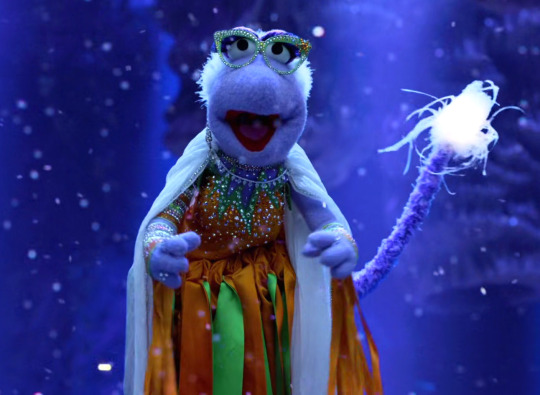
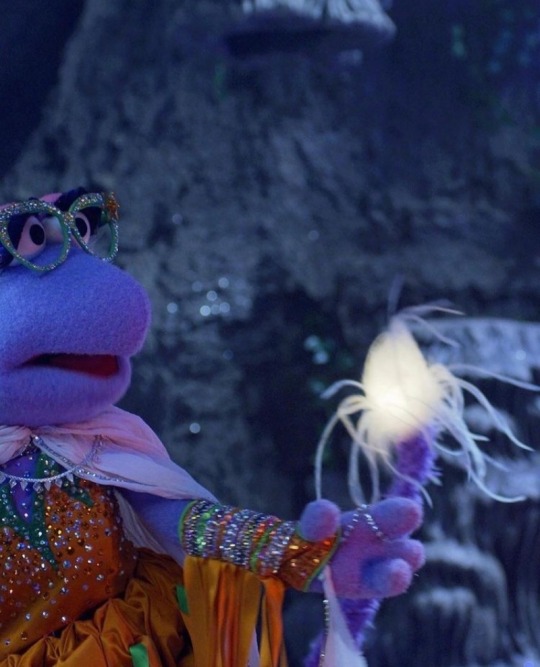
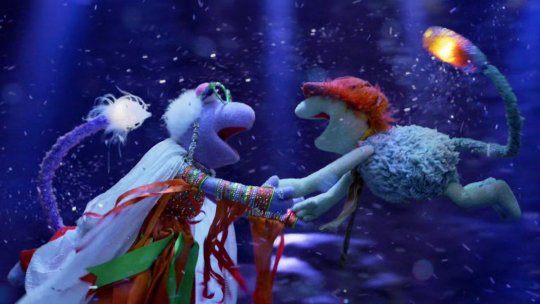
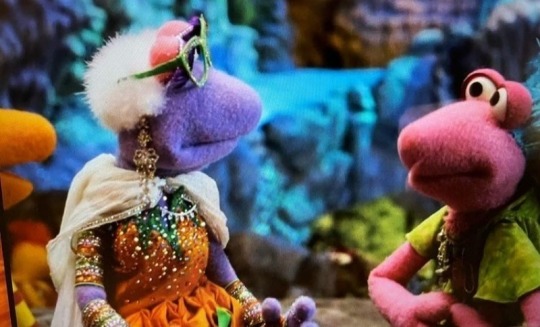
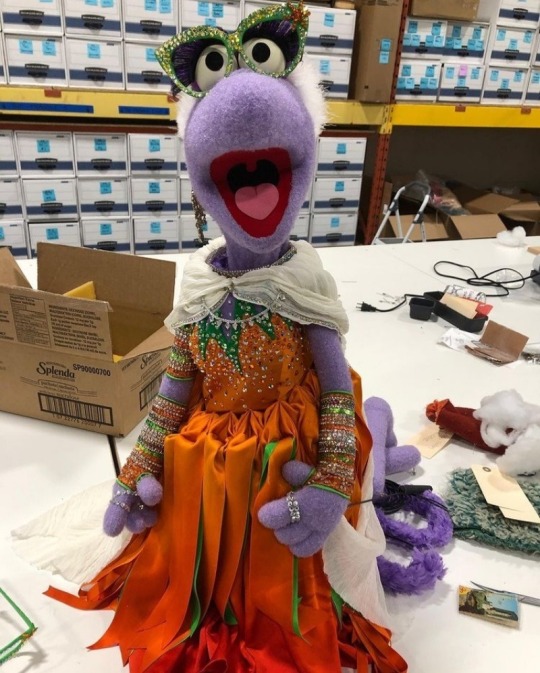

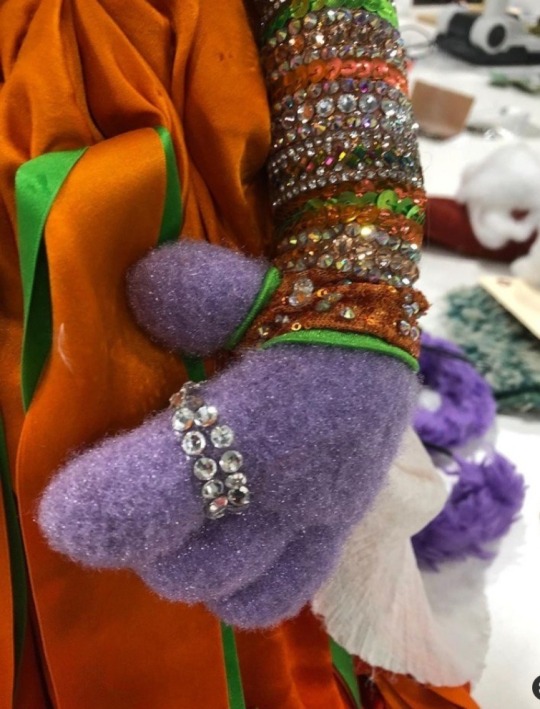
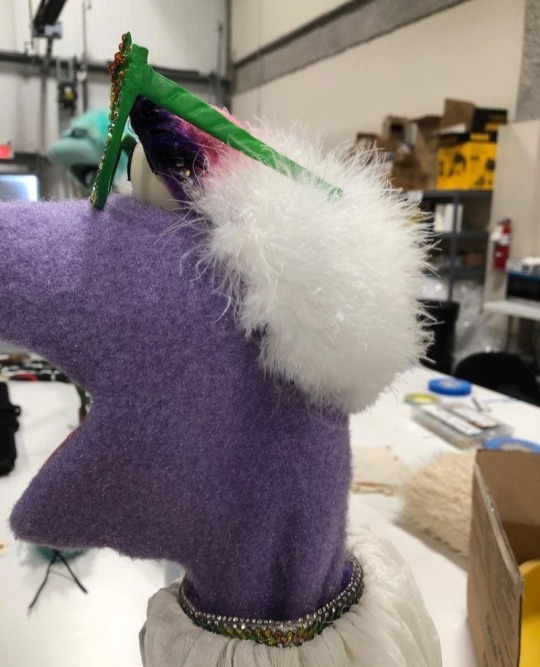

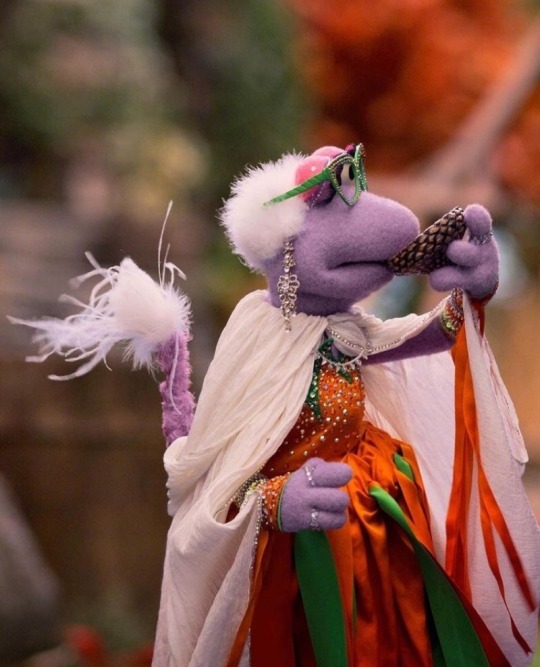
The Archivist
PERFORMER Cythia Erivo voice
Aymee Garcia puppetry
DEBUT 2022
The Archivist is the keeper of all important treasures of Fraggle kind, first seen in the Fraggle Rock: Back to the Rock episode "The Glow." She originally hails from Shhh Pond and possesses some form of magical properties allowing her (and even others) to float rather than walk.
She is summoned to Fraggle Rock by Uncle Traveling Matt to inspect the latest artifact he's sent back from Outer Space - the Bizzle of Secrets (a plastic water bottle). The Bizzle ends up stuck on Boober's tail as an ill-advised attempt to conceal his now-glowing baloobius.
When the Archivist arrives at the museum where the Bizzle will be kept, she recognizes Boober's issue very quickly. She reveals her baloobius too can glow and she spent much of her life keeping it hidden before accepting it as a beautiful part of herself.
87 notes
·
View notes
Text
Muppet Song of the Day: "Chase the Wind"
Music: Philip Balsam
Lyrics: Dennis Lee
#muppet song of the day#fraggle rock#fraggle rock: back to the rock#the archivist fraggle rock#cynthia erivo#aymee garcia#boober fraggle#dave goelz#philip balsam#dennis lee
54 notes
·
View notes
Audio
2002/06/09 - 3NT: San Francisco
Randal Keith (Valjean), Stephen Tewksbury (Javert, last performance), Jayne Patterson (Fantine), Aymee Garcia (Mme. Thénardier), J.P. Dougherty (Thénardier), Ma-Anne Dionisio (Eponine), Peter Lockyer (Marius), Sandra Turley (Cosette), Christopher Mark Peterson (Enjolras), Trent Blanton (Grantaire), Tanner Richie (Gavroche), Kassandra Marie Hazard (Young Cosette)
BRAVA Cast! So excited while listening to it! Can’t find the fit album art so no picture this time...
#Les Miserables#Randal Keith#Stephen Tewksbury#Aymee Garcia#J.P. Dougherty#Ma-Anne Dionisio#Peter Lockyer#Sandra Turley#Christopher Mark Peterson
14 notes
·
View notes